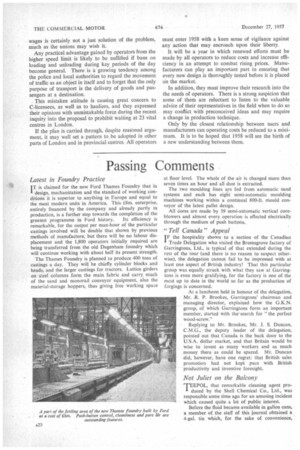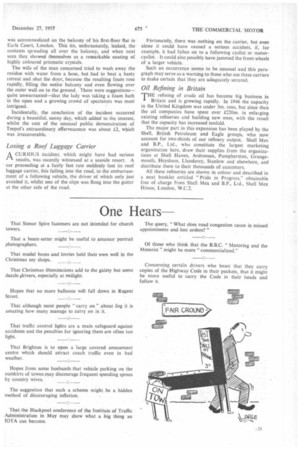Passing Comments
Page 22

Page 23

If you've noticed an error in this article please click here to report it so we can fix it.
Latest in Foundry Practice
IT is claimed for the new Ford Thames Foundry that in A design, mechanization and the standard of working conditions it is superior to anything in Europe and equal to the most modern units in America. This am, enterprise, entirely financed by the Company and already partly in production, is a further step towards the completion of the
greatest programme in Ford history. Its efficiency is remarkable, for the output per man-hour of the particular castings involved will be double that shown by previous methods of manufacture, but there will be no labour displacement and the 1,800 operators initially required are being•transferred from the old Dagenham foundry which will continue working with about half its present strength.
The Thames Foundry is planned to produce 400 tons of castings a day. They will be chiefly cylinder blocks and heads, and the larger castings for tractors. Lattice girders on steel columns form the main fabric and carry, much of the sand and monorail conveyor equipment, also the material-storage hoppers, thus giving free working space at floor level. The whole of the air is changed more than seven times an hour and all dust is extracted.
The two moulding lines aye fed from automatic sand systems and each has eight semi-automatic moulding machines working within a continual 800-ft. mould conveyor of the latest pallet design.
All Cores are made by 39 semi-automatic vertical coreblowers and almost every operation is effected electrically through the medium of push buttons.
"Tell Canada" Appeal
1F the hospitality shown to a section of the Canadian Trade Delegation who visited the Bromsgrove factory of Garringtons, Ltd., is typical of that extended during the rest of the tour (and there is no reason to suspect otherwise), the delegation cannot fail to be impressed with at least one aspect of British industry! That this particular group was equally struck with what they saw at Garringtons is even more gratifying, for the factory is one of the most up to date in the world so far as the production of forgings is concerned.
At a luncheon held in honour of the delegation, Mr. R. P. Brookes, Garringtons' chairman and managing director, explained how the G.K.N. group, of which Garringtons form an important member, started with the search for "the perfect wood-screw."
Replying to Mr. Brookes, Mr. I. S. Duncan, C.M.Ci., the deputy leader of the delegation, pointed out that Canada is the back door to the U.S.A. dollar market, and that Britain would be wise to invest as many workers and as much money there as could be spared. Mr. Duncan did, however, have one regret; that British sales promotion had not kept pace with British productivity and inventive foresight.
Not Juliet on the Balcony
TEEPOL, that remarkable cleaning agent produced by the Shell Chemical Co., Ltd., was responsible some time ago for an amusing incident which caused quite a lot of public interest. Before the fluid became available in gallon cans, a member of the staff of this journal obtained a 4-gal. tin which, for the sake of convenience,
was accommodated on the balcony of his first-floor flat in Earls Court, London. This tin, unfortunately, leaked, the contents spreading all over the balcony, and when next seen they showed themselves as a remarkable coating of highly coloured prismatic crystals.
The wife of the man concerned tried to wash away the residue with water from a hose, but had to beat a hasty retreat and shut the door, because the resulting foam rose rapidly, filling the entire balcony and even flowing over the outer wall on to the ground. There were suggestions— quite unwarranted—that the lady was taking a foam bath in the open and a growing crowd of spectators was most intrigued.
Incidentally, the conclusion of the incident occurred during a beautiful, sunny day, which added to the interest, whilst the cost of the unusual public demonstration of Teepol's extraordinary effervescence was about £2, which was irrecoverable.
Losing a Roof Luggage Carrier
A CURIOUS incident, which might have had serious " results, was recently witnessed at a seaside resort. A car proceeding at a fairly fast rate suddenly lost its roof luggage carrier, this falling into the road, to the embarrassment of a following vehicle, the driver of which only just avoided it, whilst one of the clips was flung into the gutter at the other side of the road.
Fortunately, there was nothing on the carrier, but even alone it could have caused a serious accident, if, for example, it had fallen on to a following cyclist or motorcyclist It could also possibly have jammed the front wheels of a larger vehicle.
Such an occurrence seems to be umisual and this paragraph may serve as a warning to those who use these carriers to make certain that they are adequately secured.
Oil Refining in Britain
THE refining of crude oil has become big business in
Britain and is growing rapidly. In 1946 the capacity in the United Kingdom was under 3m. tons, but since then the oil companies have spent over £220m. in enlal ging existing refineries and building new ones, with the result that the capacity has increased tenfold.
The major part in this expansion has been played by the Shell, British Petroleum and Eagle groups, who now account for two-thirds of our refinery output. Shell Mex and B.P., Ltd., who constitute the largest marketing organization here, draw their supplies from the organizations at Shell Haven, Ardrossan, Pumpherston, Grangemouth, Heysham, Llandarcy, Stanlow and elsewhere, and distribute them to their thousands of customers.
All these refineries are shown in colour and described in a neat booklet entitled " Pride in Progress," obtainable free of charge from Shell Mex and B.P., Ltd., Shell Mex House, London, W.C.2.




















































































